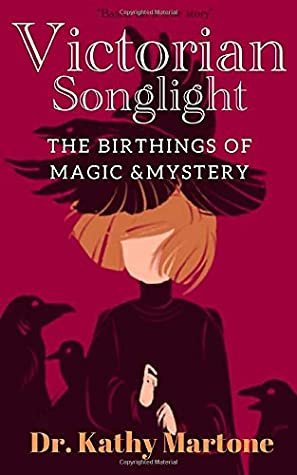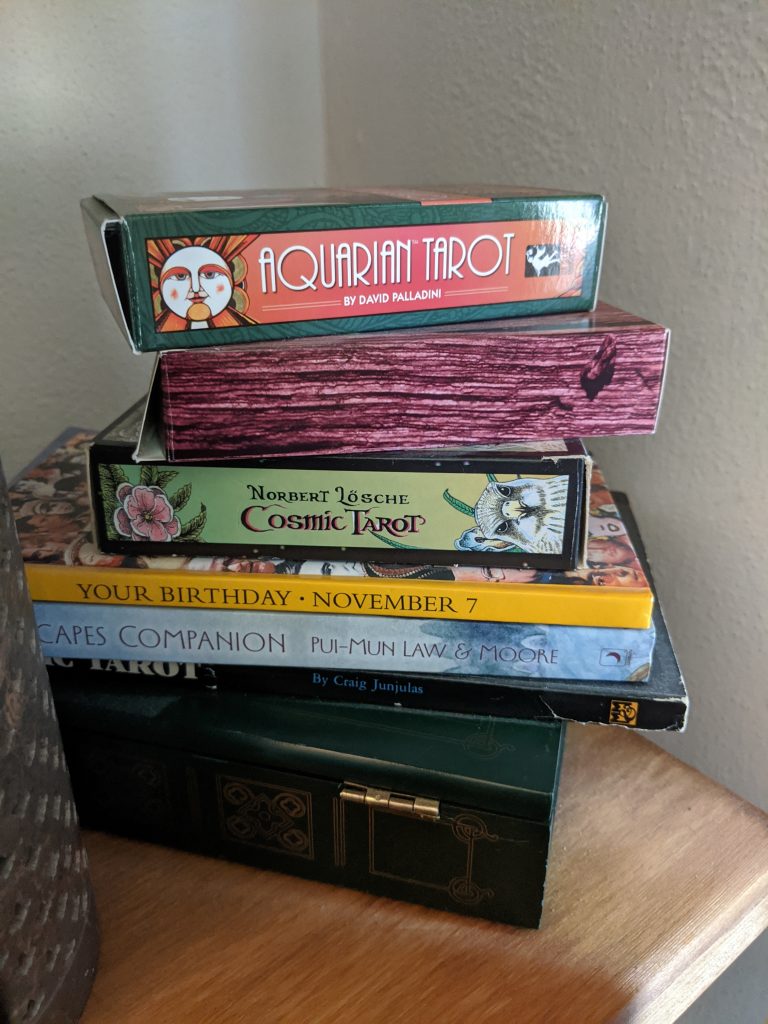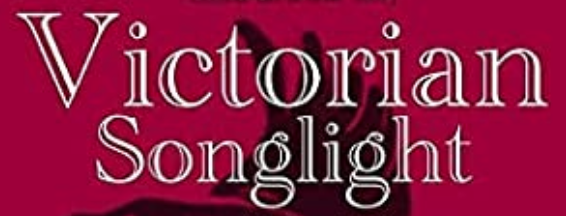Kathy Martone send me a copy of her novel Victorian Songlight.

Description from Goodreads:
The birth of a magical child at the time of the Devil Moon sets the stage for heartache and misery, magic and supernatural love. Beset by unrelenting obstacles and bestowed with remarkable psychic gifts, Kate is often accompanied by fantastical black ravens who carry her through time and space. A well known legend in the Ozark Mountain countryside where Kate lives, Grandfather is a ghost with large golden eyes who frequently rides on the back of Pegasus, another Ozarkian legend. Victorian Songlight is a tale of redemption and renewal, death and rebirth, triumph over darkness. But most importantly, it is a love story. Alone and utterly forsaken, adrift on treacherous waters, Kate meets Grandfather for the second time in her life and they become lovers fulfilling a prophecy at the moment of her birth.
Review:

New Age twaddle. And I say that as someone who generally enjoys New Age ideas. I own six tarot deck for goodness sake. But still, I call this Metaphysical twaddle. This book had a point and it wasn’t good storytelling. It was…honestly, I’m not entirely sure what it was. Education about dream interpretation and past life regressions probably. But I don’t feel like I was taught anything, so maybe not.
What I was was insulted and outraged repeatedly. So much so that I’m struggling to be kind in this review. Struggling even after considering that, as far as I see publicly, this book and possibly author, have yet to receive a bad review and may react poorly.
Let’s start with the fat-shaming. Attractiveness is clearly linked to thinness several times in this book, but never so directly as in this quote on page 94.
Carrying a little too much weight on her frame to be called attractive…
I believe my initial reaction was “Fuck you, Martone” and that’s how I feel now too. Because guess what? I’m fat. I am carrying more than ‘a little too much weight” on my frame and the author has now informed me that people who look like me can’t be considered attractive. And this wasn’t a character’s comment that could then be shown to be wrong-headed. It was the narrator’s description of a woman and stood unchallenged. So, again, Fuck you, Martone.
Next, let’s move on to the more amorphous appropriation of cultural beliefs and the treatment of non-whiteness. The book opens with a white couple having a baby that is delivered by a black midwife/sorceress named Jessie. (So, already we have the cliched “magical negro.”) She spoke in such a painfully stereotypical manner I literally flinched. Let me give you an example from page 12.
Dat chile o’ yorn, Mistah Hank, is mighty gifted, being she was born on da night o’ da Devil Moon. Dat birthmark, as you call it, is da mark of dat light in da night sky.
This could have just been character building, giving her a speech pattern, if there had been any other black characters to contrast it with. Jessie does not reappear in the book at any point and was the only explicitly black character. The fat woman above, Trina, is nicknamed Mrs. Bojangles—presumably, because she wears a lot of bracelets (which I’m inferring because we’re told she’s covered in metal) and in reference to the black tap dancer Bill ‘Bojangles’ Robinson—so maybe she’s meant to be a character of color. I kind of hope not though, since she’s later referred to by one white character to another as “not like us.” But that’s the closest I can come to a not dreamed or spirit guide character being non-white. Certainly, no important characters are clearly not white. Maybe I’ll later be told, “X was meant to be Y.” But as of now, I can’t recall one.
Next, we meet Grandfather, the main character’s spirit guide slash ‘spiritual husband’, who is described as Oriental looking. Is he a rug? Then we’re treated to quite a lot of Buddhist ideas. Grandfather even calls himself the Medicine or Blue Buddha. Followed by the appearance of some generic pan-Indian chieftains in their large feathered headdresses. I think I even remember Egyptians in there somewhere.
I feel like the author just had no self-awareness at all in writing this book. At one point, some practice or another is referred to as being for the Native American Elders only…and then the white woman goes and engages it.
Oh, and let’s not forget Pegasus. Because if you’re going to have casual racism, Orientalism, and appropriation of Native American traditions why not throw in some Greek mythology too…in Arkansas. I mean, that’s exactly where you’d expect to find a Greek winged horse, hanging out with your Oriental looking Buddah-spirit guide in small-town Arkansas. Right? I mean like, obviously.
There was also the painfully shallow treatment of prolonged childhood sexual abuse. It’s literally given two sentences.
…she sought out the help of a new therapist—only to discover that the dreams were, in fact, true. Not only had she been physically and verbally abused, but her father had also molested her, apparently from a young age.
It’s referred to at other times in the book, but it’s basically glossed over in the same manner. (This was also super jarring because until this moment the only appearances of the parents had been at her birth and the parents seemed happy to have a baby.) Add in that too many characters seem to have been molested as children; and the whole thing takes on extra ick when you consider the sexual love affair with a character called Grandfather and the crush Kate had on her uncle as a child.
Then there is the treatment of LGBT people. A gay couple is introduced in the middle of the book, who instantly encourage Kate to become a lipstick lesbian and we’re told:
Kate grimaces slightly, fearful that Gabe will give away the secret she just recently shared with him–the secret of her fifteen-year-long marriage to Miriam.”Okay, smart ass,” Kate retorts, “Know any single dykes around town? If the body’s willing, I’m able.” Laughing hysterically, everyone at the table raises their glasses in a toast to Kate’s sexuality. Kate breathes a huge sigh of relief that, for now, her previous life as a lesbian remains hidden.
This might not be so bad if it wasn’t the first mention of women loving women in the book. Kate had spent the previous 100 pages moaning about being rejected by men and falling instantly in love with Grandfather and then the token Jewish man. And it might not be so bad if being a lesbian wasn’t presented as laughable or something to be hidden. Or the idea of it being previous, but not current (or future as, other than one brief conversation with the ex-lover, lesbianism is never mentioned again and Kate only has relationships with men). Was it supposed to be a phase? And it might not be so bad if the use of dyke didn’t feel like a slap in the face coming out of a mouth of such a character.
I felt the same way about the fact that Kate is a toker. It would be fine if the book at all engaged the fact that she and her friends can get stoned at a dinner party (or bake edibles) without ever fearing judicial or social sanctions. This wouldn’t be so bad (not every book has to be like ‘check your privilege’), except that all of Kate’s food is repeatedly mentioned as organic, her furnishings are often referenced as antiques, her stemware is mentioned by fancy brand name, she goes to a week-long silent retreat, and even takes a (separate) six week-long guided tour to Tibet. All without ever seeming to have to go regularly to work. So, already she kind of feels like this economically exceptional character. So, having her eagerly and frequently engage in an activity that people not protected by whiteness and wealth can’t as safely feels notable. (Arkansas isn’t a marijuana decriminalized state and it’s not specified that Kate AND ALL HER FRIENDS have medical cards.)
Then there is the disconnect between the fact that Kate is always moaning about how she’s been rejected so many times, “woes is me, my life is so horrible,” etc. But throughout the book, she is surrounded by lovely friends who obviously genuinely care about and help her. It makes her feel extremely self-centered and unappreciative. I found her unlikable in the extreme. Which I feel a little bad saying, considering the based on a true story printed on the cover. I strongly suspect a lot more of this is autobiographic than I expected going in.
I don’t know Martone (beyond the necessary discussion to request a book review). So, I can’t know if she is aware of what sensitivity readers are. But I suggest she invest the couple hundred bucks to have her books read by a sensitivity reader in the future. Because as infuriating as I found this book, I didn’t sense that Martone had any ill-intent, just ignorance. I honestly believe she’d tell you that she did a good thing by including a diverse cast in her book. After all, there’s a (maybe) black woman and a gay couple and she included Oriental looking men and Native Americans and a variety of body shapes. Right?
It’s no Carlos Castaneda, but the writing is mechanically sound, it is competently edited, and it has a great cover. Despite that, the writing irked me severely. I’d call it amateurish if not for the fact that it’s readable. There are FAR TOO MANY exclamation points! Names and endearments are used too often in the often unnatural sounding dialogue. People are constantly crying as if it’s the only way characters can express emotion (and often without a scene building the emotion to necessitate tears). There are far too many unneeded descriptive details. (I don’t need to know if the wine is in the left or right hand or what someone on the phone looks like). It’s written in the present tense and the flashbacks stall the plot (what very little plot there is) constantly. Plus, it’s almost entirely telling and dialogue, with very little showing in the narrative, which makes it hard to connect with. And since I’m letting go with both barrels, I’m baffled by the inclusion of Dr. for the author of a piece of fiction. It doesn’t feel relevant. All in all, as much as I hate to be the wet blanket, I strongly disliked this book.
